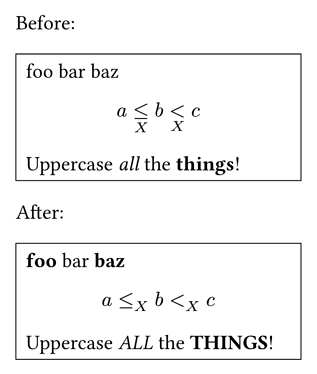(Credit for this answer goes to @laurmaedje who wrote it here, here, and a few times earlier on Discord, and to @Eric for recommending fold().)
There is a general and two more specific ways to do this:
- using a loop or equivalent to generate and apply multiple show rules
- using regular expressions with alternatives (
|)
- using
selector.or()
since the specific ways cover the most common use cases and are also better performance-wise, let’s start with these:
Regular expressions
The first two cases actually only concern strings. With "foo" and "baz" it’s obvious, but the symbols can also be easily converted to strings and are generally treated by Typst this way. That means we can construct a regular expression that handles all the values in a single show rule:
#let words = ("foo", "baz")
#show regex(words.join("|")): strong
foo bar baz
#let symbols = (sym.lt, sym.lt.eq)
#show regex(symbols.join("|")): math.scripts
$ a <=_X b <_X c $
Detour: matching whole words
If you want to match words, you’ll usually only want to match whole words. The regular expression “word boundary” matcher \b can be used for this purpose:
#let words = ("his", "hers")
#show regex(words.map(word => "\b" + word + "\b").join("|")): strong
his and hers but not this
The complete regex in this example ends up to be \bhis\b|\bhers\b, which means “either the complete word his or the complete word hers”
selector.or()
The matches of a show rule are determined by a selector, and although Typst’s selectors can’t do everything, most cases where you want the same kind of show rules for multiple targets can be handled with or():
#let elements = (emph, strong)
#show selector.or(..elements): upper
Uppercase _all_ the *things*!
Regexes and strings can not be combined using selector.or(), so if you want to apply a rule to, say ("foo", emph), you’ll need to write two show rules; one with all the strings and regexes, the other with all the other targets.
Actually generating show rules in a loop
In case even that is not enough, there is still a way to actually generate show rules in a loop. First of all, what’s the problem with the original approach?
#let words = ("foo", "baz")
#for word in words {
show word: strong
}
foo bar baz
Each show rule only applies until the end of the scope it appears in, and that is the current iteration of the loop. There is no content in the loop, so each show rule applies to nothing.
The solution is to apply the same principles shown in the Making a Template tutorial, just a bit more creatively. First, we move the (still manually duplicated) rules into a “show everything” rule:
#show: body => {
show "foo": strong
show "baz": strong
body
}
foo bar baz
We now have the rest of the document in a variable body which we can work with. Now, one solution is using a loop and replace body with something that has one extra show rule applied in each iteration:
#let words = ("foo", "baz")
#show: body => {
for word in words {
body = {
show word: strong
body
}
}
body
}
foo bar baz
This works, but it can be slightly shorten by using the array.fold() method which is perfectly suited for this situation:
#let words = ("foo", "baz")
#show: body => words.fold(body, (body, word) => {
show word: strong
body
})
foo bar baz
As mentioned above, this is not great for performance. Regardless of how you do it, having a large numbers of show rules active at the same time is not great. It’s usually okay if every show rule is written out, but creating them in a loop can hide how expensive a piece of code is. Whenever possible, the approaches above are preferable.
